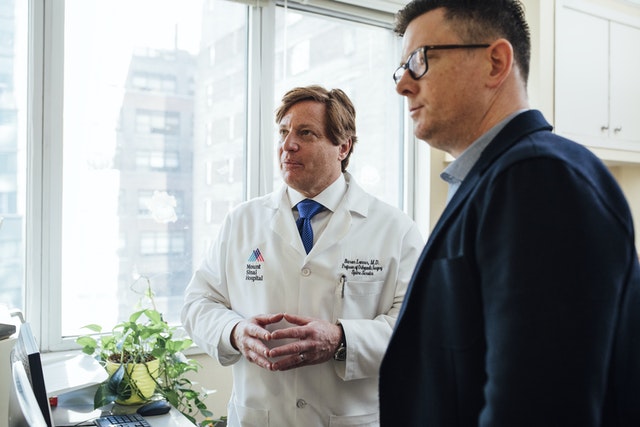
There are many different types of specialist doctors that you can consult with, depending on your specific needs. This guide will help you understand the roles and specializations of different types of specialists so that you can make an informed decision about which doctor is right for you. Whether you need a general practitioner or a more specialized doctor, we have all the information you need to make the best choice for your health.
What is the role of a specialist doctor?
A specialist doctor is a medical doctor who has completed additional training in a specific area of medicine. Specialist doctors can be primary care physicians, such as family doctors and pediatricians, or they can be doctors who specialize in a certain area of medicine, such as cardiology or oncology.
Specialist doctors are experts in their field and can offer patients the most up-to-date treatments and procedures. They often work with other healthcare professionals, such as nurses and physiotherapists, to provide comprehensive care for their patients.
Specialist doctors play an important role in the healthcare system, and their skills and knowledge are essential for ensuring that patients receive the best possible care.
How does a doctor become a specialist?
In order to become a specialist, a doctor must complete an accredited residency program and pass a specialty board exam. After completing their residency, the doctor may then apply for a position at a hospital or other medical facility. Some doctors may also choose to open their own private practice.
There is no one-size-fits-all answer to this question, as the path to becoming a doctor specialist can vary depending on the specific field and subspecialty. However, there are some common steps that most doctors will need to take in order to become specialists. First, after completing medical school, doctors will need to complete a residency program in their desired specialty. For example, doctors who want to become cardiologists will need to complete a residency program in cardiovascular medicine.
After completing a residency program, many doctors choose to pursue fellowship training in order to receive more specialized training in their chosen field. Once they have completed their training, doctors can then apply for certification from the relevant Board of Specialty Societies. Once they are certified, doctors can officially start calling themselves specialists.
How do I choose a specialist doctor?
When it comes to specialist doctors, there are a few key factors to keep in mind:
1) Consider their area of expertise and make sure it aligns with your needs.
2) Take into account their experience level to ensure they’re able to provide the care you need.
3) Consider their location and whether or not you’re comfortable traveling to see them.
Additionally, it’s important to get a feel for the doctor themselves and whether or not you click with them. Once you’ve considered all of these factors, you’ll be well on your way to finding the best specialist doctor for you.
What can a specialist doctor do for me?
A specialist doctor can provide you with specific and targeted medical care. They can offer you a higher level of expertise than your general practitioner, and can also help to diagnose and treat more complex conditions.
Specialist doctors can also offer you access to specialist treatments and medications that may not be available through your general practitioner. If you have a complex medical condition or are seeking specialist treatment, then seeing a specialist doctor may be the best option for you.
However, it is important to note that specialist care can be expensive, and may not be covered by your health insurance. As such, it is important to weigh up the costs and benefits of specialist care before making any decisions.
When should I consult a specialist doctor?
There are a few occasions when you should consult with a specialist doctor. These include:
– When you have been diagnosed with a chronic or serious illness
– You have been injured in an accident
– When you are experiencing a difficult pregnancy
– When you are undergoing cancer treatment
– If you are considering surgery
There is no one-size-fits-all answer to this question, as the decision of when to consult a specialist doctor depends on each individual’s unique medical needs and situation. However, in general, it may be appropriate to consult a specialist doctor if you have a complex or chronic medical condition that your primary care doctor is unable to effectively manage, or if you require a specific type of treatment or procedure that your primary care doctor is not able to provide.
If you are unsure whether or not you should consult a specialist doctor, speak with your primary care doctor for guidance.
Which specialist doctor manages pregnancy-related issues?
If you’re pregnant and looking for a doctor, you may be wondering what kind of specialist you need. There are many different types of specialists who can help with pregnancy, so it’s important to choose the right one for your needs. Here is a brief overview of some of the most common types of specialist doctors for pregnancy:
Obstetricians
These doctors specialize in pregnancy and childbirth. They will provide care throughout your pregnancy and delivery, and can also offer guidance on things like nutrition and exercise during pregnancy.
Gynecologists
These doctors specialize in women’s health, including reproductive health. They can provide care during pregnancy and after delivery, and can offer advice on things like contraception and sexually transmitted infections.
Family physicians
These doctors provide general medical care for all members of the family. They can offer guidance on things like nutrition and exercise during pregnancy and can provide care during pregnancy and after delivery.
What specialist doctor for thyroid problems?
If you’re looking for a doctor who specializes in thyroid problems, you may want to consider seeing an endocrinologist. Endocrinologists are doctors who specialize in treating conditions that involve the endocrine system, which includes the thyroid.
Many endocrinologists have extensive experience treating thyroid disorders, so they can be a good option if you’re looking for specialized care. You can ask your regular doctor for a referral to an endocrinologist, or you can search for one in your area using an online directory.
Our Internal Medicine specialists can help you with thyroid-related issues.
What specialist doctor treats sciatica?
There is no one specific type of doctor that treats sciatica, as the condition can be caused by a variety of underlying issues. However, many specialists who treat sciatica are orthopedic surgeons, neurosurgeons, or pain management doctors.
There are other specialist doctors who can treat sciatica, depending on the underlying cause. For example, if the sciatica is caused by a herniated disc, then a doctor specializing in spine disorders may be consulted. If the sciatica is caused by a pinched nerve, then a doctor specializing in nerve disorders may be consulted.
Reach out to Dr. Jay Bender, MD for more details.
Which specialist doctor treats carpal tunnel syndrome
There are a number of different specialist doctors who can treat carpal tunnel syndrome, depending on the severity of the condition. In some cases, a general practitioner may be able to provide treatment, while in other cases, a specialist doctor such as an orthopedic surgeon or a neurologist may be required. If the condition is severe, surgery may be necessary to correct the problem.
In most cases, however, carpal tunnel syndrome can be treated with a variety of non-surgical methods. These may include splinting, steroid injections, and physical therapy. In some cases, changing the way you perform activities that may contribute to the condition (such as using different keyboard techniques) may also be helpful.
Reach out to Dr. Jay Bender, MD for more details.
Which specialist doctor treats arthritis
There are many different types of doctors that specialize in treating arthritis, depending on the specific type of arthritis that a patient has. Some common specialists include rheumatologists, orthopedic surgeons, and physical therapists. In some cases, a general practitioner or primary care doctor may be able to provide care for arthritis patients as well
Reach out to Dr. Jay Bender, MD for more details.
Which specialist doctor to consult for breast pain
Some doctors who specialize in breast health and breast pain include general surgeons, plastic surgeons, oncologists, radiologists, and endocrinologists. If you are experiencing breast pain, it is important to consult with your primary care doctor or gynecologist first in order to get a proper diagnosis and treatment plan. From there, they may refer you to a specialist doctor depending on the cause of your breast pain.
Dr. Naoko Okada is an expert Breast Surgeon, click here to visit her page.
Which specialist doctor to consult for leg swelling
There are a few different types of specialists who might be able to help with leg swelling. A doctor who specializes in vascular health or circulation could be a good option, as they can help to improve blood flow and reduce swelling.
A doctor who specializes in orthopedics or rheumatology might also be able to help, as they can provide treatments for conditions that can cause leg swelling.
In more serious situations, leg swellings, especially affecting both legs, could be a sign of kidney failure. In this case, a nephrologist is the right doctor for you.
Ultimately, it is best to consult with your primary care doctor to get a referral to the most appropriate specialist for your needs.
If you are suffering from chronic kidney issues, and you have noticed some leg swelling, your primary doctor may recommend that you see a nephrologist like Dr. Juan Jaller Char, MD.
Which specialist doctor to consult for vitamin deficiency
There is no one-size-fits-all answer to this question, as the best doctor to consult for vitamin deficiency will depend on the specific type and severity of your deficiency. However, some specialist doctors who may be able to help include nutritionists, naturopathic doctors, and gastroenterologists. If you are unsure which type of doctor is right for you, speak to your primary care doctor for a referral.
Vitamin deficiencies are a common problem, especially among people who don’t eat a balanced diet. Functional medicine practitioners often recommend vitamin supplementation to help correct imbalances and improve overall health.
There are many different vitamins that are important for human health, but some of the most common deficiencies include vitamins A, C, and D. Vitamin A deficiency can lead to vision problems, while vitamin C deficiency can cause scurvy. Vitamin D deficiency is linked to a number of health problems, including osteoporosis and heart disease.
If you think you might be deficient in any of these vitamins, it’s important to talk to your doctor or a functional medicine practitioner. They can order tests to check your vitamin levels and make recommendations
Which specialist doctor to consult for hair loss
Specialist doctors who may be able to help with hair loss include dermatologists, trichologists, and general practitioners. In addition, there are many over-the-counter treatments and home remedies that can be effective in treating hair loss. However, it is important to consult with a specialist doctor before beginning any treatment.
Hair loss for men and women is a common issue that dermatologists see on a regular basis. There are many potential causes of hair loss, and a dermatologist can help you determine the cause of your hair loss and develop a treatment plan. If you are experiencing hair loss, consider making an appointment with a dermatologist to discuss your options.
Hair loss can be caused by many different factors, including hormonal imbalances. The endocrine system regulates hormone levels in the body, and if there is an imbalance, it can lead to hair loss. There are many different hormones that play a role in hair growth, so an imbalance in any of them can cause hair loss. Treatment for hair loss due to hormonal imbalances will depend on the underlying cause.
Sometimes, hair loss is temporary and will resolve on its own with time. In other cases, medication or surgery may be necessary to correct the imbalance and restore hair growth. If you are experiencing hair loss possibly due to endocrine disease, talk to an endocrinologist or internal medicine specialist, to find out if hormonal imbalances are the cause and what treatment options are available.
Which specialist doctor treats fatty liver disease?
There are a number of specialist doctors who treat liver disease, depending on the specific condition. Some common specialists include hepatologists (liver specialists), gastroenterologists (digestive system specialists), and primary care physicians. In some cases, patients may also see a transplant surgeon if they require a liver transplant.
There are many different types of liver diseases, and each one has its own set of causes, symptoms, and treatments. Some common liver diseases include hepatitis (viral inflammation of the liver), cirrhosis (scarring of the liver), and fatty liver disease (accumulation of fat in the liver).
Liver disease can also be caused by diabetes. Diabetes is a condition that results in high blood sugar levels. When blood sugar levels are high, they can damage the liver and other organs. over time, this can lead to liver disease.
If you have liver disease due to high cholesterol in your blood, your doctor may recommend a cholesterol-lowering medication. Cholesterol is a substance that can build up in your blood and cause problems.
Liver disease can make it harder for your body to remove cholesterol from your blood. This can lead to a buildup of cholesterol in your blood vessels, which can increase your risk for heart disease and stroke.
If you have liver disease, it is important to see an internal medicine doctor so that you can get the proper treatment. Treatment for liver disease may include medication, lifestyle changes, and surgery.
Which specialist doctor to consult for high cholesterol
The best specialist doctor to consult for high cholesterol is an Internal Medicine specialist. Internal Medicine doctors are experts in heart health and can help you manage your condition. They can also prescribe medications to help lower your cholesterol levels. If you have severe high cholesterol, you may need to undergo treatment to remove the excess cholesterol from your arteries.
Which specialist doctor treats diabetes?
There are several different types of doctors who treat diabetes, including endocrinologists, diabetologists, and primary care physicians. However, any doctor can treat diabetes, depending on the severity of the condition. For example, a primary care doctor may be the first doctor to diagnose diabetes, but an endocrinologist or diabetologist may be needed for more complicated cases.
Treatment for diabetes typically includes lifestyle changes, medication, and close monitoring by a healthcare team.
Endocrinologists are experts in hormone disorders, and diabetologists focus specifically on diabetes. Your doctor will work with you to create a treatment plan that is right for you.
Why is it so hard to get a specialist doctor appointment?
There are a number of reasons why specialist doctor appointments can be difficult to schedule. In some cases, there may be a limited number of specialist doctors in a given area. This can make it difficult to find an appointment that fits your schedule. In other cases, specialist doctors may be in high demand and their appointment schedules may be full. This can make it difficult to get an appointment with the specialist you need.
Also, some specialist doctors may only see patients by referral from another specialist doctor. This can make it difficult to get an appointment unless you have a referral from a doctor who is familiar with your condition.
One of the many reasons it’s so hard to get a specialist doctor appointment is that there are more patients than there are doctors. In 2014, the Association of American Medical Colleges (AAMC) predicted that by 2025 the U.S. will have a shortage of between 46,000 and 90,000 physicians. This shortage is due in part to an aging population and the Affordable Care Act, which has increased the number of people with health insurance.
Another reason it’s difficult to see a specialist is that they often have very limited availability. They may only work a few days a week or see patients by appointment only. This can make it hard to get an appointment within a reasonable time frame.
In some cases why specialist doctor appointments can be difficult to schedule is that specialist doctors often require a referral from a primary care physician. This means that you may need to see your regular doctor first in order to get a referral to see a specialist. Depending on your insurance coverage, this may add another layer of difficulty and cost to the process.
Additionally, specialist doctors tend to be located in major metropolitan areas, which can make them inaccessible for patients who live in more rural areas.
What is the best way to speak with a specialist doctor?
There are many ways to speak with a specialist doctor, but the best way may be through telemedicine. Telemedicine is a growing field that allows patients to consult with doctors remotely. This can be done via video conferencing, phone calls, or even online chat. specialist doctors who participate in telemedicine can offer their patients more convenient access to care, and patients can avoid long wait times or travel.
The specialist doctors who participate in telemedicine can also offer their patients more flexibility when it comes to scheduling appointments. Patients can often schedule appointments outside of normal business hours, which can be convenient for busy families or working professionals.
In addition, telemedicine can allow patients to receive care from a specialist doctor who is located in a different state or country. This can be beneficial for patients who live in rural areas or who have difficulty accessing specialist care quickly.
Most specialist doctors who participate in telemedicine can also offer their patients more affordable care. Many insurance companies are beginning to cover telemedicine services, which can save patients money on co-pays and travel costs. In addition, some specialist doctors offer discounts for patients who choose to consult with them via telemedicine.
Telemedicine is a convenient, flexible, and affordable way to speak with a specialist doctor. It is quickly becoming the preferred method of communication for many patients and doctors alike.
Why are specialists joining The VIOS Clinic?
There are a number of reasons why specialists are choosing to join The VIOS Clinic, a leading provider of concierge medicine.
Concierge medicine is a type of healthcare that is becoming increasingly popular, as it offers patients a more personalized and comprehensive level of care. At The VIOS Clinic, our specialist doctors are able to provide this type of care to their patients, thanks to our innovative approach to healthcare delivery.
Our specialist doctors are also able to spend more time with their patients, getting to know them on a personal level and understanding their unique needs. This allows them to provide the best possible care for their patients.
In addition, The VIOS Clinic offers its specialist doctors a number of benefits that they would not be able to find in a traditional healthcare setting. These benefits include competitive reimbursement, flexible working hours, and a supportive environment.
The VIOS Clinic is quickly becoming the leading provider of concierge medicine, and we are proud to have specialist doctors on our team who are dedicated to providing the best possible care for their patients. If you are considering joining The VIOS Clinic, we encourage you to contact us today to learn more about our unique approach to healthcare delivery.
How do I talk with a Specialist Doctor in The VIOS Clinic?
There are many private clinics that offer concierge medicine membership plans. This means that you pay a monthly or annual fee to have access to a specialist doctor.
The VIOS Clinic is one of these private practices. To join their concierge medicine membership plan, you simply need to visit our main website, chat with our friendly triage bot and fill out a short form. After that, you’ll be able to schedule an appointment with a specialist doctor.
You can also talk to your regular doctor about concierge medicine and see if they recommend any private practices in your area. Either way, concierge medicine is a great way to get the specialized care you need from a qualified doctor.
On behalf of all the amazing specialists at The VIOS Clinic, we hope we can provide you with the personalized care you were looking for.

BLOG AUTHOR
Dr. Ismail Sayeed
Dr. Sayeed is the Medical Director of ViOS, Inc. He is a deeply committed physician entrepreneur & medical blog writer. While building the global infrastructure of the VIOS Clinic, he is dedicated to educate people on the potential of specialist telemedicine for managing chronic diseases.
Read more about him in his author bio






0 Comments